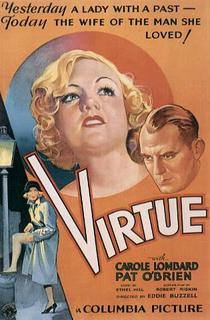The Virtues of "Virtue"
 Film buffs convened on the Castro Friday night as the Columbia Before the Code series continues. On the double bill: the 1932 comedy/drama "Virtue" and an unusual Depression drama from director Frank Borzage, "Man's Castle."
Film buffs convened on the Castro Friday night as the Columbia Before the Code series continues. On the double bill: the 1932 comedy/drama "Virtue" and an unusual Depression drama from director Frank Borzage, "Man's Castle."
"Virtue," though typical of the era, sparkles with snappy dialogue from frequent Frank Capra collaborator Robert Riskin. It helps that the film stars two fast-talking actors, Pat O'Brien and the wonderful Carole Lombard, who make the most of his script. Lombard plays Mae, a tough prostitute who the cops try to run out of town. She ignores orders to leave New York City, and while she lies low, she meets another tough but lovable sort, cab driver Jimmy (O'Brien). They fall in love and marry with a promise that her past is behind her. Money troubles and a murder threaten to break up the union half past "just married." Lombard is perfect, adding some trademark vulnerability to her "just one of the guys" act. O'Brien has never been a favorite of mine, but his bluster also fits well in this role. Mayo Methot (third wife of Bogie) is a standout as Mae's heart of gold pal with bad taste in men.
Frank Borzage is not particularly well-known as a director among the general public, but he directed some of the most interesting, socially relevant films of the Depression era. His romantic drama "Man's Castle" is an unusual film in that it deals frankly with issues of class and poverty that were plaguing the country at the time the film was made. Loretta Young (playing the most beautiful homeless person you've ever seen) meets equally down and out Spencer Tracy. He invites her to live with him in a shantytown overlooking the Brooklyn Bridge. The set for this sea of shacks (including a stylized skyline in the background) gives us one of the most interesting shots of the movie. It's charming yet ugly at the same time. Borzage wants us to see the dignity and beauty in the homeless people's lives, but he's not afraid to show us the warts as well. It's hard to like or understand Spencer Tracy's character when he cheats on the devoted Loretta Young, and seems to be threatening violence against her for most of the movie. Young becomes pregnant, and Tracy begrudgingly decides to marry her. But he considers robbing a toy factory to leave her some money before he rides the rails to leave her to single motherhood. After the code, nearly everyone in the film would have to be "punished" for their misdeeds and flaws. Though the film seems disjointed in that it is trying to be too many things at once, it offers a far more realistic picture of the time than the escapist fare about well-to-do people that was drawing audiences in the early 30s.
2 comments:
So far I've been to three of the double bills (Friday, Sunday, Monday) and these two were by far the best. I expected to love Man's Castle and did, but Virtue was one of those from-out-of-nowhere surprises that just floors you. What a script!
According to my tally so far, Mills of the Gods and No Greater Glory were quite good, Washington Merry-Go-Round was fair, and Ann Carver's Profession was a fascinating stinker. But none delivered on the promise I felt after getting back in the pre-code swing of things with Friday's pair. I'll probably only go one more night (most likely Wednesday). I'm not expecting another Man's Castle or Virtue, but maybe I'll be surprised.
I really wish I had been able to see the Stanwyck double feature. I was too tired to stick around for the movie which played after "Ann Carver." I heard that the Columbia films were not that well-attended at the Castro, which is a shame since I fear they won't take a chance on any other lesser known oldies for a while.
Post a Comment